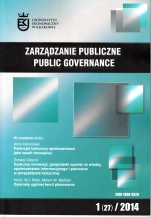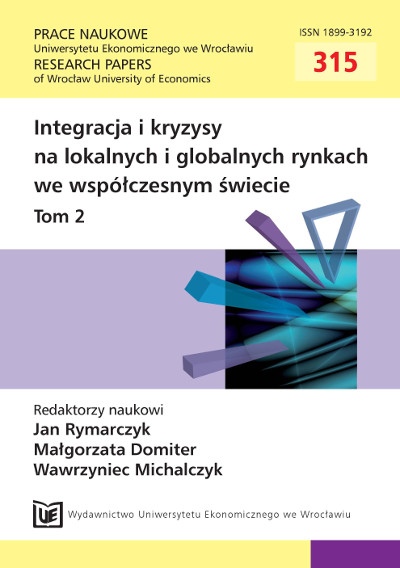
Reviews: Peter G. Northouse, Leadership. Theory and Practice
Recenzje: Peter G. Northouse, Leadership. Theory and Practice
Keywords: Reviews
More...
Keywords: Reviews
More...
Keywords: public discourse; axiology; political communication; Polish Prime Ministers; exposé
The main aim of the paper is to present the results of the survey on the axiological sphere of the government programme addresses (exposés) of the Polish Prime Ministers in 1989–2012. Th e fi rst step of the analysis is the lexical analysis of the speeches gathered in the text corpus. Th e results of statistical evaluations are word frequency lists which are used for the analysis of certain word concordances and collocations. The effect is the reconstruction of common patterns of important word co-occurrences. In this phase of the survey, the units of analysis are words, so the intensity of the analyzed text attributes is measured by the number and percentage range of certain words. The next phase of the survey is computer-assisted content analysis. For the research purposes, dictionaries of the categories were created which consisted of sets of words with the same semantic basis. Th e unit of analysis in this phase is a sentence, and the result of the analysis is a hierarchy and ‘keyness’ of collective symbols in the Prime Ministers’ speeches. The result of the next phase is an axiological map of the discourse of values in the analyzed exposés. In the last part of the research, as a result of factor analysis, the structure of the discourse is reduced to several strongest factors determining which different (detailed) categories have the tendency to co-occur and therefore create easily distinguishable confi guration of miranda (i.e. what we should admire, adore, love, fi ght for, support) and condemnanda (i.e. what we should condemn, hate, fi ght against) representing various values (and anti-values) in the exposés of Polish Prime Ministers.
More...
Keywords: WTO; trade liberalization; negotiations; Doha Agenda
The Doha Round began with a ministerial-level meeting in Doha, Qatar in 2001. Despite the ambitious agenda of the negotiations, the WTO members failed to meet the deadline settled in Doha. The main negotiations problems still are: agriculture, the special safeguard mechanism (SSM), sensitive products, NAMA. The causes of lack of compromise are also the system of decision making under WTO and the domestic situation in member countries caused by the financial crisis.
More...
Keywords: technology alliances; technology cooperation; joint venture; technology contractual agreements
The paper discusses trends and patterns in inter-firm technology partnering over the past four decades. The analysis concentrates on the description and the evolution of different forms of technology alliances including the international context.
More...
Keywords: International Monetary Fund; IMF crisis lending; IMF lending instruments; IMF aid instruments; IMF response to the global financial crisis
International Monetary Fund (IMF) has been playing a very important role in the stabilization and recovery processes during the ongoing global financial crisis between 2008 and 2013. It seems that the lending activity of the institution was the most important for countries experiencing different forms of economic distress. IMF trying to meet its strategic goals and mission has been using an extended kinds of lending instruments in order to adjust financial support to the beneficiaries’ needs. Furthermore IMF had to increase the total value of its financial resources to meet a high demand for lending instruments and reformed available credit tools to be more efficient as a “lender of last resort”. As a consequence the main research aim of the presented paper is an attempt to characterize the most important and crucial aspects of the IMF lending activity during the crisis, in particular to present and analyze currently used financial instruments and the scale of the IMF lending operations (in terms of geographical and value scope).
More...
Keywords: financial and economic crisis; new Member States of the European Union; wealth; deficit; public debt
Problems of the American financial and banking sector in 2008 were quickly imported to Europe. The loss of liquidity by the major European financial institutions caused the economic downturn. The depth of the recession was different in various countries of the European Union. Among the new Member States small Baltic states and the Balkan states having large current account deficit have suffered the most. The economies of Estonia, Lithuania and Latvia “shrunk” over 10 per cent in 2008−2009. In 2010 the standard of living in Latvia was lower than at communist times.
More...
Keywords: trade in services; exports and imports of services in the world; Europe and Poland; trade in services and the economic crisis
The article presents a study on the size of the international trade in services in the world, the European Union and Poland, the changes in the branch structure of international trade in services and the main exporters and importers of services. The research included the years 2004-2011, which allowed the analysis of the phenomena both from before the economic crisis, as well as during its duration. In most cases, higher turnovers were observed in 2011 than in the early years of the crisis (starting in 2008) − both in exports and imports, which may indicate a reversal of the negative trend of international trade in services.
More...
Keywords: cluster; regional policy; competitiveness; innovation
Cluster policy has recently gained an increasing impact on the regional economy. Its aim is to increase the competitiveness and innovation of enterprises located within given economic cluster. The development of local capital markets should be a fundamental issue in regional policy. An important role should be played by public authorities, because any economic cluster cannot properly operate without their support.
More...
Keywords: determinants of foreign direct investment; models with panel data
This paper examines the economic and institutional determinants of FDI in European countries, from 1996 to 2011. This study utilized the panel data model to examine this issue. The observations confirmed the presence of significant differences between the variables of FDI in developed and developing countries. The empirical results support that FDI in developed countries is positively correlated to population and regulatory quality index. For developing countries the impact of GDP growth , GDP per capita and government effectiveness index are significant. It is interesting that the lack of political freedom and the rule of law and order does not have a negative impact on FDI in developing countries.
More...
Keywords: price volatility; food; the European Union; global market
Excessive volatility in food prices impacts both manufacturers and consumers and leads to serious effects on food security of developing countries which import food. Before the financial and economic crisis on the international markets there was a sharp increase in prices of food products, called the food crisis. The reaction to this crisis was to restrict freedom of agricultural trade in certain developing countries and in countries highly developed the discussion on food security issues once more began. The main aim of the work is the presentation of the issue of price instability on the modern global market. To the specific objectives of the task is to show the consequences of price instability, attempting to counter such a situation on the world market and the impact of instability prices for food security.
More...
Keywords: crisis; symptoms of the crisis; concepts; strategies
In the short outline the article presents the influence of the crisis in the organization. What consequences can be, when an enterprise is becoming ponderous and not very elastic in times when global crises often repeat. More problematic is becoming the problem what the crisis is and how it affects the development of enterprises. In what way organizations can effectively prepare for the coming of the crisis and what symptoms are preceding the advent of the recession. The purpose of this article is first of all to present modern conceptions and solutions which are functioning in the developed economy, which contribute to the development and the expansion of enterprises into new markets and which also effectively warn against coming of the crisis and eliminate its influence. When “a storm is coming, some are erecting walls, others are building windmills”. Thanks to the arising and overcoming of the crisis, the enterprise can notice new chances and directions of the development and learn effectively to struggle with appearing problems. Concepts and strategies which are discussed in this work are in modern organizations which are not afraid of crises and can even see their profit in it.
More...
Keywords: export; import; agri-food products; EU; NAFTA; liberalization of world trade
The aim of the paper is to present the state and possibilities of development of agri-food trade of the European Union and NAFTA in the conditions of implementation of the new agricultural agreement negotiated under the WTO auspices. A general equilibrium model of Global Trade Analysis Project was used in the research to make ex ante projections. There were two variants of the simulation analysis differing in the degree of reduction of customs tariffs. At first it was assumed that the liberalization of world agricultural trade would follow the proposals contained in the draft modalities of December 2008. In the second variant full multilateral liberalization of global trade in agricultural products was assumed.
More...
Keywords: crisis; eurozone; debt; liquidity; bonds; Outright Monetary Transactions (OMT)
The article presents the instruments that are used in the European Central Bank to resolve the crisis in the eurozone. In addition to conventional monetary policy measures emergency actions were discussed, and among them a new instrument called Outright Monetary Transactions (OMT). It consists in the unlimited buying of bonds of eurozone countries by the ECB on the secondary market. The program should contribute to the stabilization of the bond markets, as well as to the implementation of structural reforms in the countries in crisis.
More...
Keywords: European Union; regional policy; sustainable development
The paper presents the development of the EU regional policy and its impact on the sustainable development of the Lubuskie region. The considerations focus on the origins, goals, instruments, structural funds and dimension of sustainable development conducted on the basis of the analysis of resource documents related to EU regional policy. Regional policy remains the key aspect of the functioning of the European Union and its current shape results from the support of structural changes and levelling out the differences in the standard of living in particular EU member countries.
More...
Keywords: competitiveness; euro zone; direct investment; crisis; trade exchange
This paper presents a brief overview of the impact of European integration on the international competitiveness of national economies in three fields: international trade, foreign investment and labour market, including the role of the economic crisis 2007+. We used a modified version of the classical concept of the “magic quadrangle” of competitiveness, i.e. the GDP growth rate, international trade (especially the current account situation), labour market (measured by the growth rate of unemployment) and inflation. The issue of inflation was presented briefly, because the transfer of responsibility for monetary policy to the supranational level of ECB means that inflation does no longer directly reflect the situation of the national economy. The aspect of foreign direct investment was revised because of its vital role in shaping the state’s economic situation. It is also one of the main fields of the direct competition of national economies. This paper assesses the impact of the first decade of the euro zone functioning on the national economies competitiveness till the outburst of the crisis. We also analyzed the impact of the crisis on the competitiveness of the euro zone and identified the economic problems that were highlighted by its outburst in the euro zone states.
More...